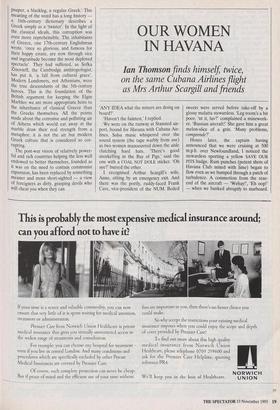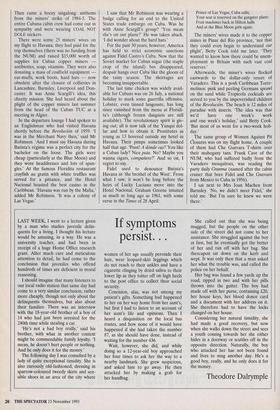OUR WOMEN IN HAVANA
Ian Thomson finds himself twice,
on the same Cubana Airlines flight as Mrs Arthur Scargill and friends
'ANY IDEA what the miners are doing on board?'
`Haven't the faintest,' I replied.
We were on the runway at Stansted air- port, bound for Havana with Cubana Air- lines. Salsa music whispered over the sound system (the tape warbly from use) as two women manoeuvred down the aisle clutching hard hats. 'There's good snorkelling in the Bay of Pigs,' said the one with a COAL NOT DOLE sticker. `Oh aye?' burred the other.
I recognised Arthur Scargill's wife, Anne, sitting by an emergency exit. And there was the portly, ruddy-faced Frank Cave, vice-president of the NUM. Boiled sweets were served before take-off by a glossy mulatta stewardess. 'Leg room's a bit poor, 'nt it, luv?' complained a minework- er. 'Russian aircraft!' She gave him a great melon-slice of a grin. `Many problems, comprende?'
Hours later, the captain having announced that we were cruising at 500 m.p.h. over Newfoundland, I noticed the stewardess sporting a yellow SAVE OUR PITS badge. Rum punches (potent shots of Havana Club mixed with lime) began to flow even as we bumped through a patch of turbulence. A commotion from the rear- end of the aircraft — 'Wehayr, `Eh oop!' — when we banked abruptly to starboard. Then came a boozy singalong: anthems from the miners' strike of 1984-5. The entire Cubana cabin crew had come out in sympathy and were wearing COAL NOT DOLE stickers.
There were some 25 miners' wives on my flight to Havana; they had paid for the trip themselves (there was no funding from the NUM) and raised $15,000 worth of supplies for Cuban copper miners — antibiotics, soap, vitamins. They were also donating a mass of coalfield equipment — ear-muffs, work boots, hard hats — now obsolete after the closure of collieries in Lancashire, Barnsley, Liverpool and Don- caster. It was Anne Scargill's idea, this charity mission. She had heard about the plight of the copper miners last summer from the head of the Cuban TUC at a meeting in Algier.
In the departure lounge I had spoken to an Englishman who had visited Havana shortly before the Revolucion of 1959. 'I was in the Merchant Navy then,' said Mr Robinson. 'And I must say Havana during Batista's regime was a perfect city for the bachelor on the loose. The girls were cheap (particularly at the Blue Moon) and they wore headdresses and lots of span- gles.' At the famous Floridita restaurant crayfish au gratin with white truffles was served for a pittance, and the Hotel Nacional boasted the best casino in the Caribbean. 'Havana was run by the Mafia,' added Mr Robinson. 'It was a colony of Las Vegas.' I saw that Mr Robinson was wearing a badge calling for an end to the United States trade embargo on Cuba. Was he with Anne Scargill's group? 'You mean she's on our plane?' He was taken aback. 'I did wonder about the hard hats.'
For the past 30 years, however, America has held to strict economic sanctions against Fidel Castro's Cuba. Now that the Soviet market for Cuban sugar (the staple crop of the island) has disappeared, despair hangs over Cuba like the gloom of the rainy season. The shortages are becoming insupportable.
The last time chicken was widely avail- able for Cubans was on 26 July, a national holiday to mark some guerrilla offensive. Lobster, even tinned langouste, has long since vanished from the menu at Floridi- ta's (although frozen daiquiris are still available). The revolutionary spirit is giv- ing out; all is now talk of the Yanqui dol- lar and how to obtain it. Prostitutes as young as 13 hovered outside my hotel in Havana. Their pimps sometimes looked half that age. `Pssst! A dOnde vas? You like a Cuban lady? Nice puia. No? Maybe you wanna cigars, compatiero?' And so on, I regret to say.
Fidel used to denounce Batista's Havana as 'the brothel of the West'. from what I saw, it won't be long before the heirs of Lucky Luciano move into the Hotel Nacional. Graham Greene intuited as much as long ago as 1961, with some verse in the Times of 28 April: Prince of Las Vegas, Cuba calls;
Your seat is reserved on the gangster plane: Fruit machines back in Hilton halls And at the Blue Moon girls again.
The miners' wives made it to the copper mines in Pinar del Rio province, 'not that they could even begin to understand our plight', Betty Cook told me later. 'They wanted to know how there could be unem- ployment in Britain with such vast coal reserves.'
Afterwards, the miner's wives flocked eastwards to the dollar-only resort of Varadero. This is a posh Caribbean Torre- molinos: pink and peeling Germans sprawl on the sand while Tropic°la cocktails are served to you by the impoverished children of the Revolucian. The beach is 12 miles of paradise with insects. 'The idea was that we'd have one week's work and one week's holiday,' said Betty Cook. 'But most of us went for a two-week holi- day.'
The same group of Women Against Pit Closures was on my flight home. A couple of them had Che Guevara T-shirts over their mahogany tans. Frank Cave of the NUM, who had suffered badly from the Varadero mosquitoes, was reading the party daily Granma (named after the cabin cruiser that bore Fidel and Che Guevara from Mexico to Cuba in 1956).
I sat next to Mrs Joan Machen from Barnsley. 'No, we didn't meet Fidel,' she told me. 'But I'm sure he knew we were there.'



























































 Previous page
Previous page